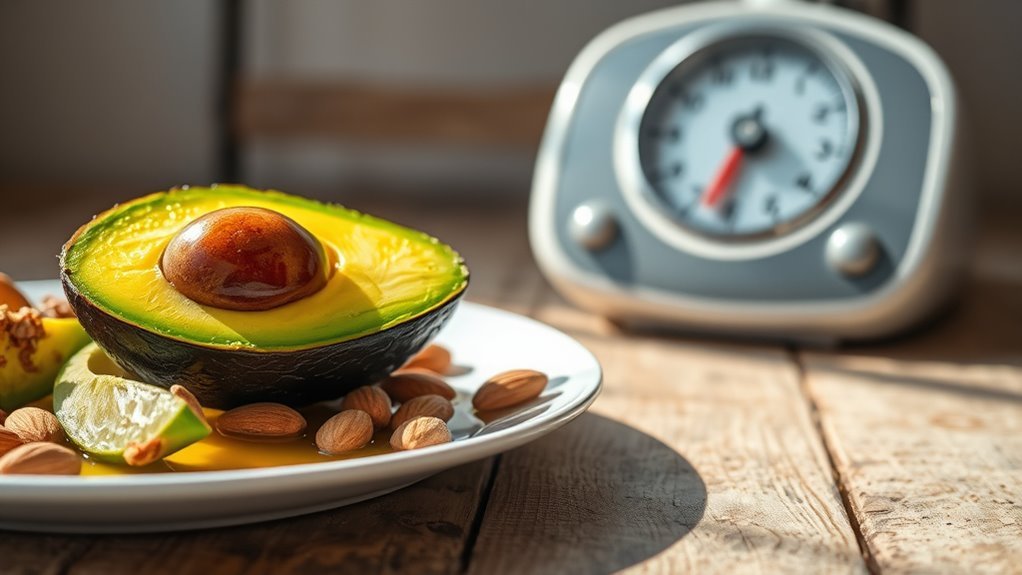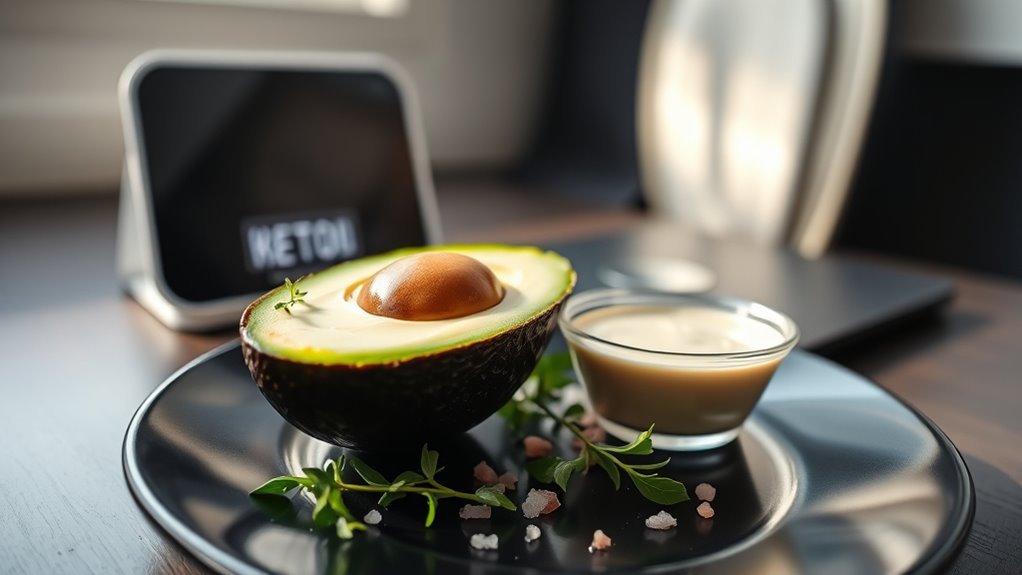If you’re not losing weight on a keto diet, hidden carbs might be sabotaging your efforts. Ingredients like maltodextrin and corn syrup can unexpectedly increase your carb intake. Also, make sure you aren’t consuming too many calories overall; a caloric deficit is essential for burning fat. Additionally, underestimating portion sizes, hormonal imbalances, and high stress can further hinder your progress. There are more factors to take into account, which could help you fine-tune your approach.
Hidden Carbs in Your Diet

Although you might think you’re sticking to a strict keto diet, hidden carbs can easily sneak into your meals and sabotage your weight loss efforts. Many processed foods contain hidden sugars that don’t align with your low-carb goals. When you check food labels, pay special attention to ingredients like maltodextrin, corn syrup, or any form of sugar—these can considerably increase your carb intake without you realizing it. Even foods marketed as “keto-friendly” can contain unexpected carbs if you don’t read the fine print. By being vigilant about food labels and choosing whole, unprocessed foods, you can reclaim control over your diet. This awareness empowers you to make choices that truly support your keto lifestyle, fostering the freedom you desire in your weight-loss journey. Additionally, tracking your food intake can help identify hidden carbs that may be derailing your progress.
Insufficient Caloric Deficit

Even if you’re tracking hidden carbs diligently, another factor could be hindering your weight loss on a keto diet: an insufficient caloric deficit. If your caloric intake is too high, you might find it challenging to shed those pounds, even on a low-carb plan. Creating a caloric deficit is vital for weight loss, as it forces your body to tap into stored fat for energy. Additionally, understanding your daily carb limits is essential for achieving and sustaining desired results.
| Caloric Intake | Weight Maintenance |
|---|---|
| Too High | Weight Gain |
| Balanced | Maintenance |
| Too Low | Muscle Loss |
| Just Right | Steady Progress |
To achieve your weight loss goals, make sure you’re not only eating keto-friendly foods but also managing your caloric balance effectively.
Underestimating Portion Sizes

When you’re on a keto diet, it’s easy to underestimate portion sizes, which can greatly impact your weight loss efforts. Many people focus solely on the carbohydrate content, forgetting that fats and proteins also contribute to overall caloric intake. Practicing portion control is essential; even healthy fats can add up quickly.
To stay on track, consider incorporating food tracking into your routine. By accurately measuring your servings, you’ll gain a clearer picture of your actual caloric intake. This awareness helps prevent hidden calorie accumulation that can stall your progress. Remember, the freedom of a keto diet comes with responsibility—being mindful of how much you eat is vital for achieving your weight loss goals. Additionally, focusing on healthy fats can ensure that you’re not only staying within your calorie limits but also achieving nutritional balance. Make portion sizes a priority, and you’ll likely see better results.
Hormonal Imbalances
Hormonal imbalances can greatly hinder your weight loss efforts on a keto diet, as these fluctuations play an essential role in regulating metabolism and appetite. For instance, if your thyroid function is compromised, it can slow down your metabolism, making it harder to shed pounds, even on a low-carb plan. Hormonal fluctuations, particularly in insulin and cortisol, can also influence how your body stores fat and utilizes energy. If you’re struggling to lose weight, it might be worth examining these imbalances. Simple lifestyle changes, like optimizing sleep and nutrition, can help restore hormonal balance, allowing you to experience the freedom that comes with effective weight loss. Understanding your hormones empowers you to make informed decisions on your keto journey.
Stress and Sleep Quality
Stress can greatly influence your weight loss efforts on a keto diet, primarily through the release of stress hormones like cortisol, which may promote fat storage. Additionally, poor sleep quality can hinder your body’s ability to manage these hormones effectively, making it harder to shed those extra pounds. Recognizing the impact of stress and sleep on your weight loss journey is essential for achieving your goals.
Impact of Stress Hormones
Balancing your body’s stress hormones can be essential for weight loss success on a keto diet. High cortisol levels, often triggered by stress, can lead to increased cravings and fat storage, making it harder to shed pounds. Effective stress management techniques, such as mindfulness, yoga, or even regular exercise, can help lower cortisol and promote a healthier metabolic state. Additionally, when cortisol levels are balanced, your body can more effectively utilize the fats and proteins from your keto diet. Remember, the goal isn’t just to lose weight but to feel free and energized. By addressing stress, you’re not only supporting your weight loss journey but enhancing your overall well-being, allowing you to thrive on your keto path.
Importance of Sleep Quality
Quality sleep plays a significant role in your weight loss journey, especially on a keto diet. When you prioritize sleep hygiene, you’re not just resting; you’re setting the stage for effective weight loss. Poor sleep can lead to hormonal imbalances that hinder your progress. Here are three essential aspects to focus on:
- Consistency: Try to go to bed and wake up at the same time each day to regulate your body’s internal clock.
- Environment: Create a dark, cool, and quiet bedroom to promote quality rest.
- Limit Distractions: Reduce screen time before bed to improve sleep quality and enhance fat-burning processes.
Metabolic Adaptation
While you might expect consistent weight loss on a keto diet, metabolic adaptation could be hindering your progress. This phenomenon, sometimes referred to as metabolic slowdown, occurs when your body adjusts to a lower caloric intake by reducing its energy expenditure through adaptive thermogenesis. Fundamentally, your metabolism slows down to conserve energy, making it harder to lose weight despite your efforts. If you’ve been on keto for a while, your body may have adapted, leading to plateaus in weight loss. To combat this, consider cycling your calorie intake or incorporating intermittent fasting. Additionally, it’s essential to monitor nutritional intake closely to ensure you’re not missing out on vital nutrients that could support your weight loss journey. Remember, it’s vital to listen to your body and adjust your approach, ensuring you maintain a sense of freedom in your dietary choices while working towards your weight loss goals.
Frequently Asked Questions
Can I Eat Dairy on a Keto Diet?
Yes, you can eat dairy on a keto diet! However, the types of dairy you choose matter. Opt for high-fat options like cheese, cream, and butter, which are low in carbs. Be cautious with milk and yogurt due to their lactose content, which can add extra carbs. Always check labels to maintain your carb limits. Enjoying dairy in moderation can offer delicious flexibility while staying within your keto goals!
How Long Does It Take to Enter Ketosis?
It usually takes about 2 to 7 days to enter ketosis, depending on your individual metabolism and carbohydrate intake. You might start noticing ketosis symptoms like increased energy, reduced hunger, or even a slight headache. This ketosis timeline can vary, so don’t stress if it takes a bit longer. Staying consistent with your carb restriction and increasing healthy fats can help speed up the process and get you feeling great!
Are All Fats Equal on a Keto Diet?
Not all fats are equal on a keto diet, despite what you might think. Sure, you can munch on bacon and cheese, but your body craves healthy fats like avocados and olive oil, which provide essential nutrients. Prioritizing these fat sources can improve your health and support weight loss. Balancing your fat intake with quality choices means you’re not just indulging; you’re truly nourishing your body for long-term success.
Can I Drink Alcohol While on Keto?
Yes, you can drink alcohol while on keto, but you’ll want to choose keto-friendly drinks like dry wine, spirits, or sugar-free mixers. Alcohol can affect your metabolism and may slow down weight loss due to its calorie content and potential to increase cravings. Moderation is key, so be mindful of your choices. Always verify you’re staying within your carb limit, and enjoy your freedom without derailing your progress!
Is Exercise Necessary for Weight Loss on Keto?
No, exercise isn’t strictly necessary for weight loss on keto, but it can enhance your results. Incorporating varying exercise intensity can boost your metabolic adaptation, helping your body burn fat more effectively. While keto can promote weight loss independently, combining it with regular physical activity may lead to better overall health and fitness. Finding a balance that feels right for you is key, allowing you the freedom to enjoy your lifestyle while reaching your goals.
Frequently Asked Questions
Why am I not losing weight on a keto diet?
There are several reasons why you may not be losing weight on a keto diet. First, you might be consuming more calories than you realize, even if those calories come from keto-friendly foods. Additionally, some individuals experience a weight loss plateau due to metabolic adaptation, where the body becomes more efficient at utilizing energy, thus slowing down weight loss. Other factors include hormonal imbalances, lack of physical activity, stress, and insufficient sleep, all of which can impact weight loss efforts.
Am I eating too many carbs without realizing it?
Yes, it’s possible to consume more carbs than you think, especially if you’re not tracking your food intake. Hidden carbs can be found in sauces, dressings, and even some vegetables. To ensure you stay within your daily carb limit, consider using a food diary or a keto tracking app to log everything you eat. This can help you identify and adjust portions or eliminate foods that may be hindering your progress.
Could I be in a caloric surplus on keto?
Absolutely. While the keto diet can lead to weight loss for many, it is still possible to gain weight or maintain your current weight if you are consuming more calories than your body burns. High-fat foods, even healthy ones, are calorie-dense, so it’s important to monitor your portion sizes. Tracking your caloric intake and ensuring you are in a caloric deficit is key to losing weight, regardless of the diet you follow.
How does stress affect weight loss on keto?
Stress can significantly impact weight loss by increasing cortisol levels in the body, which may lead to weight retention, especially around the abdomen. Chronic stress can also affect your sleep patterns, further complicating your weight loss journey. Implementing stress management techniques such as mindfulness, yoga, or regular exercise can help mitigate these effects and support your weight loss goals on a keto diet.
Is it possible that I am not in ketosis?
Yes, if you are not in ketosis, your body won’t be burning fat for fuel, which is essential for weight loss on a keto diet. Factors such as consuming too many carbs, not eating enough fats, or even a deficiency in electrolytes can prevent you from reaching ketosis. To check if you’re in ketosis, consider using ketone testing strips or a ketone meter. If you suspect you’re not in ketosis, reassess your macronutrient intake and make adjustments as needed.
References
- https://www.ncbi.nlm.nih.gov/pmc/articles/PMC6313447/
- https://www.health.harvard.edu/staying-healthy/the-ketogenic-diet
- https://www.cdc.gov/healthyweight/losing_weight/index.html
- https://www.webmd.com/diet/obesity/ss/slideshow-keto-diet
- https://www.mayoclinic.org/healthy-lifestyle/nutrition-and-healthy-eating/in-depth/keto-diet/art-20410323
- https://www.jamanetwork.com/journals/jama/fullarticle/2765476
- https://www.nutrition.org.uk/healthyliving/healthyeating/keto-diet.html


